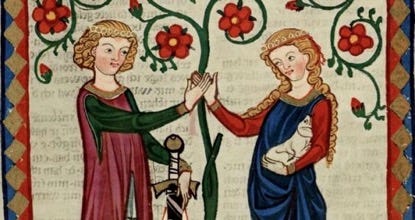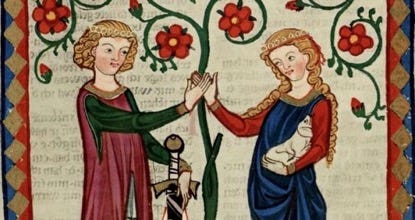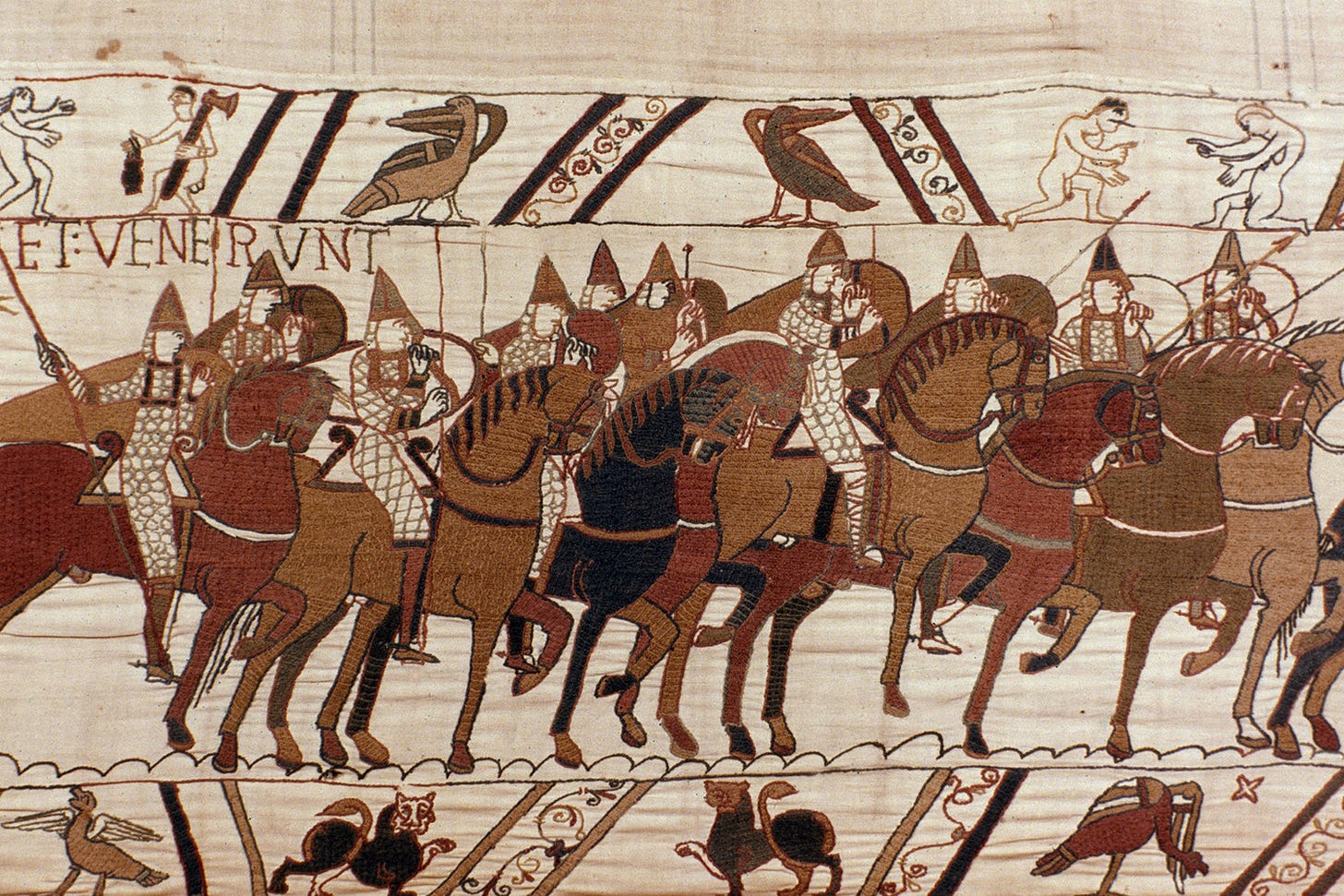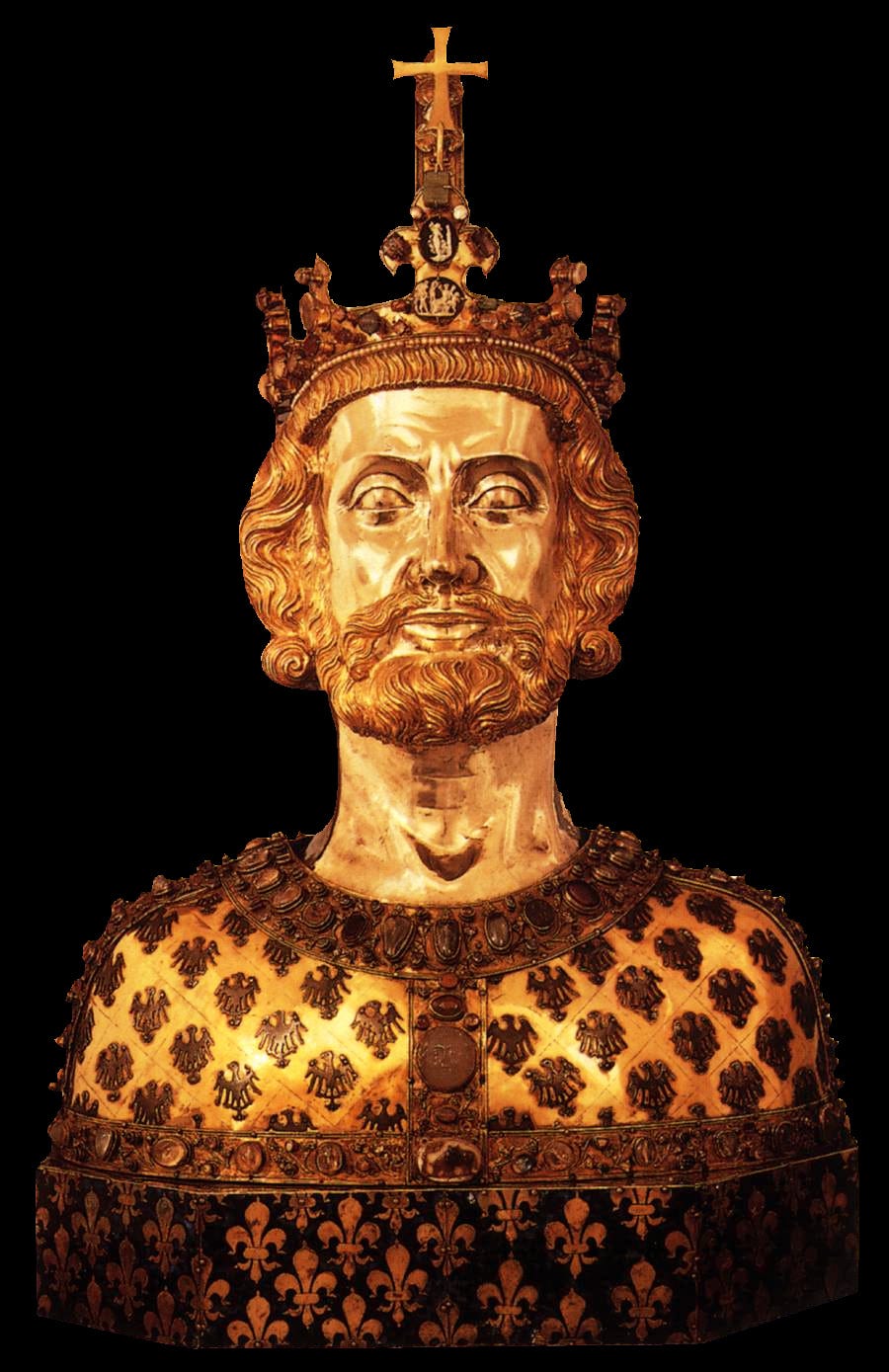This is an interview of Bonald. His name is chosen in honour of Louis de Bonald (1754-1840), the French Catholic monarchist and defender of the patriarchal family. He blogs at Throne and Altar — ‘a webpage defending the legitimate authority of God, tradition, fathers, and kings against the diabolical partisans of freedom and equality’.
Although a clear and concise writer, Bonald is a very profound thinker, so I would recommend reading this many times. Instead of interrupting his ideas with commentary, I would prefer to discuss elements you find particularly interesting in the comments.
What is conservatism?
The one sentence answer is that a conservative prioritizes meaningfulness over freedom. We human beings find ourselves faced with a dilemma. We wish to have freedom of choice; we also wish our choices to be meaningful, but with meaning comes moral stricture. Sex is a frequent subject of liberal vs. conservative disagreement, and it illustrates this vividly. Most people intuit that meaningless sexual intercourse—sex that signifies nothing—is degrading and exploitative, but to recognize the conjugal act as a symbol of self-giving and life-long commitment, to regard it as holy because a participation in the divine work of creation, automatically brings with it admittedly burdensome moral restrictions on sexual behavior. More generally, all traditional cultures mark out special places as sacred, special actions as obligatory or forbidden, special roles for different members of their communities. Certainly, these places, actions, and roles are attributed significance. The argument for freedom is that they are all arbitrary and pointless, but to discard these meanings is to render the social world barren and alienating.
The liberal prizes personal autonomy and thus believes that individuals should choose the meanings of their own acts and relationships, rather than having these imposed from outside. For a conservative, on the other hand, something that has only the significance arbitrarily assigned to it by fiat of his own will is still really meaningless. It is the “imposition” from the “outside” that the conservative is actually looking for. By acknowledging an already-given complex of meanings, he considers his spirit not constricted but enlarged by its participation in a larger order, associated with his ancestors, nature, and God.
Perhaps an example will make all this clearer.
What’s wrong with feminism?
That’s a good example.
Let me define feminism as the belief that there should be no socially imposed or encouraged distinct sex roles. I hope this is a definition that professed feminists would agree is accurate. One can imagine unreasonable feminists who would deny that there are any significant differences in the distribution of physical, cognitive, and personality traits between sexes, and one can imagine reasonable feminists who may acknowledge that such differences may exist, but would deny that anything normative should be taken from them. It may be that fewer women than men have the strength or stamina to be soldiers, they would say, but this is no reason to deny those fewer women who can do it their chance, and no reason to discourage those fewer women by allowing the culture to recognize the military as overall a male pursuit. The reasonable feminist is much more interesting, so let us respond to her.
Feminism says that normative sex roles are bad because they are constricting. Conservatives embrace them because they are potent given meanings. Having a male or female body is not just a brute biological fact; it has an intrinsic significance. My very body has within itself a calling to a particular—paternal or maternal—form of loving self-sacrifice. Men’s greater strength and aggressiveness, for example, should be understood in terms of our calling to protect our families.
Discussions of sex differences often focus on what is “natural” vs. what is “socially constructed”. However, we should remember that society is natural to man, that social structures are needed to achieve our natural ends, and that these natural goods are usually achieved in culturally particular ways. Healthy cultures often prefer to accentuate differences between the sexes in clothing, etc. That our culture regards pink as a “girl’s color” is, of course, completely arbitrary, but if it helps us to appreciate the distinctive excellence of femininity, it contributes to a natural, objective good.
What is authority and how is it different from totalitarianism?
There is a great deal of confusion about this. Let’s define “authority” as an unsophisticated subject might define it: an authority over me is someone I am morally obliged to obey. Authority is always legitimate by this definition, and it is clearly distinct from merely having the power to compel obedience. How to recognize authority is a difficult question in the abstract, but nearly always straightforward in practice—the authority is who everyone thinks is in charge. Because obedience is conceived as a duty, authority helps members of a group understand their membership in terms of participation in the larger moral order. Authorities are usually limited both in over whom they have authority, in over what subjects their authority extends, and in what they may command. A given person is often subject to multiple authorities from membership in various authoritative bodies (e.g. a family, profession, country, and Church), each receiving its legitimacy directly from God.
All societies need to be able to boss around their members, but there is disagreement about whether there should be distinct categories of rulers and subjects. Let us define “democracy” as the belief that authority should be wielded by some sort of impersonal structure or procedure, something in which all participate, rather than by individuals identifiable as rulers. The alternative is to have a frankly admitted ruler, an arrangement which we might call “authoritarianism”.
In practice, democracy always ends up being rule by the unitary mass media, which comes to control the perceptions and beliefs of the populace. A massive mind-control apparatus and consequent conformism is always a feature of mature democracy. The reason is as follows. Any increased ability to control the perceptions of the populace is rewarded with power, wealth, and the ability to further augment one’s influence, so democracies are driven to this endpoint by a process of natural selection. Democratic government is always irresponsible government, because rule is not honestly acknowledged, so the actual ruling faction never bears responsibility for its decisions, which are rather presented as the outcome of some impersonal process.
Democrats sometimes claim that their form of government fosters certain virtues associated with responsible self-rule which authoritarianism, however benignly exercised, cannot foster. This is an interesting argument, worthy of a response. Authoritarians can rightly reply in kind that democracy stunts the development of certain virtues, such as loyalty and filial devotion to a king, the humility of acknowledged subordination, and reverence for an inherited order. Furthermore, it is questionable whether democracy really does promote the virtues it advertises. For example, if the populace participates not in reasoned deliberation but unreflective partisanship, they are probably better without the experience. In fact, the virtues of exercising responsibility are better developed at the human scale of family and local community. Far from promoting these schools of virtue, the democratic state works to destroy their independence, attacking rival authorities by “liberating” their subjects, leaving itself the sole power over a social desert.
Mill defended free speech by arguing that if every side is allowed to make its case without obstruction then the truth will naturally win out. Do you agree?
No—there are many aspects of a proposition other than its accuracy which may commend itself to flawed human beings: its simplicity or memorability, its agreeableness to one’s interests or vanity. Even in communities organized for the open-ended investigation of truth (such as, at least ideally, the scientific community), speech is highly constrained, in that rhetorical moves that tend to derail the search for truth—disputing a hypothesis by attacking the character of those who hold it, by pronouncing it “offensive”, and the like—must be harshly penalized lest bad arguments drive out good. For most communities, such open-ended investigation cannot even serve as an ideal, because most communities are founded on shared loyalties and moral principles. Attacks on these loyalties and principles cannot help but be attacks on the community itself, regardless of how tolerant it wishes to be, and so all enduring societies have found ways to place their moral foundations beyond question. Censorship is a form of self-defense for morally-organized communities.
I have listed my objections to Mill’s thesis briefly because in fact all that I have written above would now be endorsed even by my worst enemies on the Left, although of course we would disagree about which principles a community should enshrine. At this time, it may be more important to remember the genuine goods that earlier liberals like Mill were trying to promote. There are indeed virtues associated with open-mindedness: the ability to recognize one’s own commitments and prejudices (without thereby renouncing them), the ability to dispassionately analyze opposing beliefs, the ability to disagree charitably and to debate cordially. It is certainly a shame that these are no longer valued even in educational institutions. Things would be much improved if censorship were recognized honestly for what it is and handled in a proper legal way. All previous societies have proscribed heresy, but they at least provided a list of exactly what beliefs constitute heresy, and legal procedure for the investigation of accused heretics, with opportunities for them to defend themselves. Therefore, I would rather there were a list of proscribed beliefs written by my worst enemy than the ability to ruin people for vague accusations of “hate” or offensiveness; and I would rather censorship were handled by a hostile government than by hostile private corporations.
You’ve written that ‘the correct way to understand Darwin’s mechanism is not that it creates order out of chaos, but that it explains how order in one order can spill over to order in another order.’ Why doesn’t evolution threaten belief in God?
Natural selection provides a powerful filtering mechanism for promoting adaptive mutations, but this presupposes an environment sufficiently fixed that the same features are adaptive over many reproductive cycles of the organism in question.
This is not a criticism of Darwinism, but a general feature of scientific explanation. Science always starts by noticing some pattern in the observable world and explaining it in terms of some more fundamental features of the world, ultimately in terms of some regular behavior of the fundamental constituents of the world, whatever these should turn out to be. Neither the initial observation to be explained nor the more fundamental regularities used to explain it are necessary truths but must be inferred. Science is an empirical discipline, after all, and cannot proceed a priori. So it will never be the case that science will provide explanations of observed order from either utterly unstructured chaos (even the nearly-uniform gas of particles present when the universe was a second old is presumed to obey fixed and intelligible laws) or from mathematical necessity (anything one derives from a posited Lagrangian or Hamiltonian is implicitly appealing to the given nature of some—perhaps unstated and ultimately mysterious—contingent being whose nature grounds this particular mathematical form). It’s not that science just hasn’t gotten there yet; the nature of scientific explanation precludes ever achieving such an unthinkable result.
In fact, neither evolution, nor the big bang, nor any other scientific origins hypothesis has fundamentally changed the issues regarding belief in a Creator. Even the least educated medieval Christian peasant was able to combine a belief that he was created by God with the knowledge about how babies are made by their parents. Really, science does not add anything to the problem.
We see, then, that the issue of understanding how God works through creation is not just a matter of answering objections from nonbelievers, but also of preserving an instinctive and correct religious attitude of gratitude to God for all His blessings, including those with natural causes. Imagine if someone decided that, because he is in fact the product of natural reproductive processes, that he is in fact not a creation of God but at best a side product of some miraculous act in the distant past (perhaps the creation of the first humans, or maybe the Big Bang). If only miracles are to be credited to God, then His acts will be few and remote and our personal connection to them very indirect.
In fact, miracles are only one way that God acts in the world, and presumably the least common. Ordinarily, God works through his creatures by holding them in existence and giving them their fundamental natures. This is God’s role of primary causality, and it exactly matches what science by its nature must take for granted. God creates parents with natural power to reproduce; one can say that the full story of a natural truth like “X begat Y” is “God causes it to be the case that ‘X begat Y’ ”. God has been creating me every moment since the moment of my conception. The other regular way of divine action is the sacramental way, action through symbols. This is not a case of God acting through the natural power He gives some creature. Symbols do not have powers; they have meanings. The water and verbal formula of baptism do not have any natural power to wash away original sin and make one a child of God, but they can signify it. God’s role is to make the meaning of the symbol true, to perform the action that the symbol evokes. When we think about what God has done for us, we mostly think of His natural and sacramental gifts.









Great points throughout! Also, fascinating insights as to what we Americans actually live out versus what the founding fathers believed as explained on his bonald.wordpress. A lot to think about (including his Catholic Monarchy explanation of 3 branches of gov't: the traditional / repository (nobles), the lawmakers/legislature, and the executive/ministry). Thanks for sharing!
‘There are indeed virtues associated with open-mindedness: the ability to recognize one’s own commitments and prejudices (without thereby renouncing them), the ability to dispassionately analyze opposing beliefs, the ability to disagree charitably and to debate cordially.’
The Catholic Church claims authority over truth about God.
Becoming Catholic requires complete submission to the truth as told infallibly by the clergy. However, the clergy are men as flawed as the rest of us. It seems the clergy lack the virtues quoted and it would be impossible to debate with them about what the truth is because they believe the truth is with them rather than above them.
Thomas Aquinas furthered the Church’s understanding of truth, which begs the question: In what other truth is the Church’s understanding partial? Aquinas also gave more acceptance for man’s senses, GK Chesterton describes the sanctification that Aquinas gave to man’s mind “If a man feels that all the movements of his own mind are meaningless, then his mind is meaningless, and he is meaningless; and it does not mean anything to attempt to discover his meaning.”. The conservative seeks meaning through subordination, but if the mind is subordinated then so too is meaning.